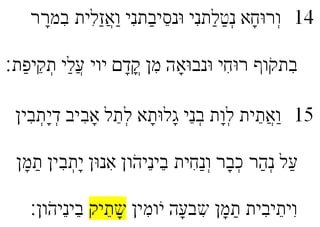I was recently reading another Q&A about Ezekiel's attitude toward his appointment as prophet. I quote from the answer there:
Daniel Block comments on the week in which Ezekiel sat stunned and bitter,
Ezekiel is infuriated by the divine imposition on his life and the implications of Yahweh's commission for him... The prophet does indeed share some of the hardened disposition of his compatriots.
The characterization of Ezekiel as stunned and bitter and the commentator's assessment that he is infuriated by the divine imposition seem to rest on 3:14-15:
The Spirit lifted me up and took me away, and I went in bitterness in the heat of my spirit, the hand of the LORD being strong upon me. And I came to the exiles at Tel-abib, who were dwelling by the Chebar canal, and I sat where they were dwelling. And I sat there overwhelmed among them seven days. (ESV)
The word overwhelmed (alternatively: astonished, stunned, distraught) is מַשְׁמִים (mašmîm) a hifil participle from √šmm "to be devastated". That would be fine if it were qal or some passive form, but the hifil seems to elsewhere1 carry the expected nuance of causation. HALOT (שמם, hif.):
- to cause to be deserted, cause to be desolated...
- to cause people to be dumbfounded... [cites Ezk. 3:15]
My hangup is that this seems to need an object,2 and the idea doesn't really reflect the emotional status of the subject. The NASB is unusual in offering causing consternation, which makes sense to me.
How do translations arrive at overwhelmed (etc.), and is that the most likely meaning?
1. The hifil occurs 17 times in the HB; 5 are in Ezekiel. In addition to the text in question:
20:26 (that I might devastate);
30:12 (I will bring desolation);
30:14 (I wil make...a desolation);
32:10 (I will make [people]...appalled).
2. According to my brief survey of the 17 hifil forms in the HB, 14 have some complement — a direct object or עַל־ (never -בְּ as follows here). The exceptions are Ezk. 3:15, Num. 21:30 (“laid waste”), and Job 21:5 (“be appalled”). The Numbers example seems like a plausible intransitive counterpart to the usual meaning; Job 21:5 seems like it might be similar to Ezk. 3:15.


